Lifestyle Management With Jonathan Yeh
Chat with MASLD AI

Hi, I am MASLD AI.
Suggested Questions :

MASLD AI 02:07 AM

In this GHAPP MASLD Community Network session, Jonathan Yeh, PA-C from Columbia University Irving Medical Center, presents a case-based discussion on the lifestyle management of MASLD (Metabolic Associated Steatotic Liver Disease) and MASH (Metabolic Associated Steatohepatitis). Through the case of a 65-year-old patient with obesity, type 2 diabetes, hypertension, and hyperlipidemia, Jonathan highlights how dietary modification, weight loss, and physical activity remain the foundation of treatment, even with new pharmacotherapies available. The presentation emphasizes the benefits of the Mediterranean diet, the importance of avoiding refined carbohydrates, and the role of both aerobic and resistance exercise in improving liver health, reducing steatosis, and potentially reversing fibrosis. Cultural considerations, patient adherence challenges, and strategies to drive behavior change are also addressed, providing clinicians with practical insights to support patients in preventing progression to advanced fibrosis or cirrhosis.
Related Podcast

Podcast: Viral Hepatitis and MASH/MASLD: Understanding the Connection

In this episode, Patrick Horne, NP from the University of Florida, explores the important connection between viral hepatitis and MASLD/MASH (Metabolic Dysfunction–Associated Steatotic Liver Disease/Steatohepatitis). While patients may present with a presumed diagnosis of MASLD or MASH, Patrick emphasizes the critical need to rule out coexisting liver diseases such as hepatitis B and C. The presence of both metabolic and viral liver diseases can significantly accelerate liver inflammation, fibrosis progression, and ultimately cirrhosis—a concept he explains using the “two-hit” or even “three-hit” theory. Patrick walks through the recommended screening protocols, including one-time HCV testing for all adults over 18 and complete HBV panels to assess for immunity, past exposure, and chronic infection. He stresses that treating viral hepatitis—especially with today's highly effective antivirals—can and should occur alongside lifestyle modification strategies for MASLD/MASH. He also discusses how liver stiffness measurements can be skewed by active inflammation and suggests reassessing fibrosis after treating viral hepatitis. This episode is a must-watch for providers managing patients with liver disease, highlighting the need for a comprehensive, layered diagnostic approach.
Watch Now
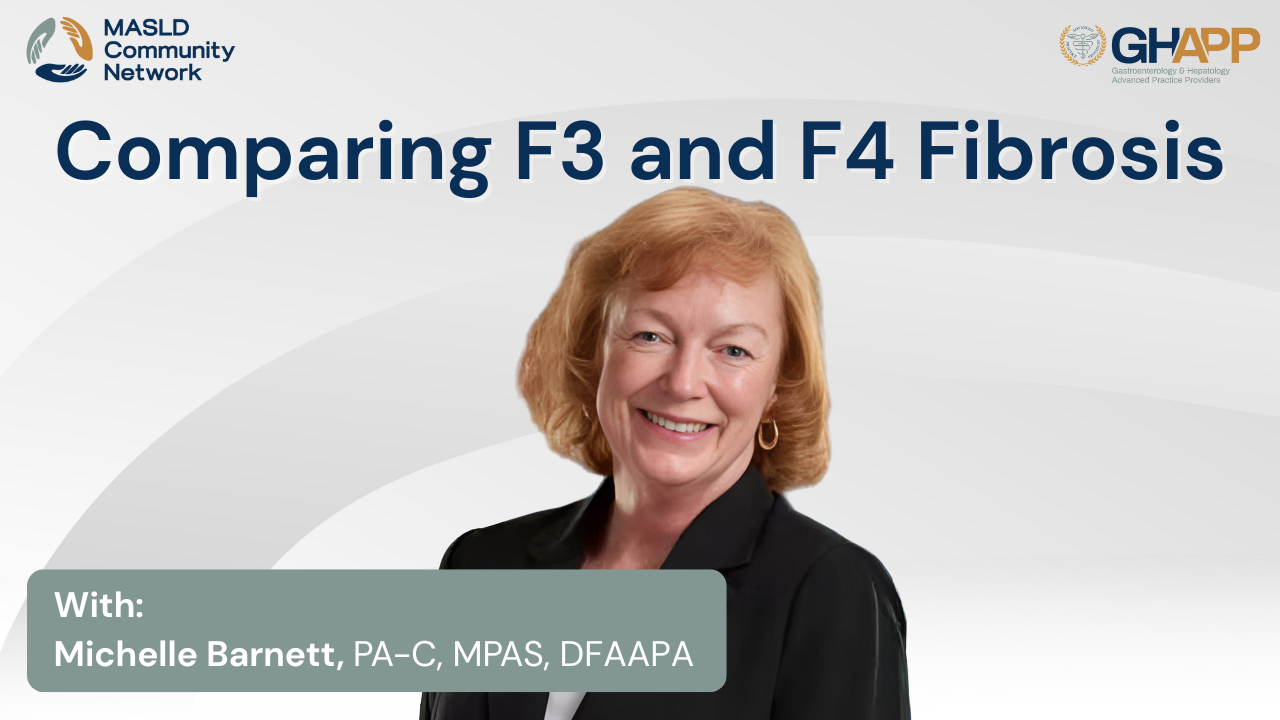
Comparing F3 and F4 Fibrosis With Michelle Barnett

In this installment of the GHAPP MASLD Community Network, Michelle Barnett, PA-C from Peak Gastroenterology in Colorado Springs, presents a deep dive into the clinical management of MASH—formerly known as NASH or non-alcoholic steatohepatitis. Through two comparative case studies, Michelle explores the nuances of diagnosing and managing patients with F3 and F4 fibrosis. Learn how to effectively use non-invasive diagnostic tools like FIB-4, FibroScan, and ELF testing, and gain valuable insights into stratifying fibrosis risk, monitoring hepatocellular carcinoma (HCC), and determining when resmetirom is appropriate. This session also covers practical guidance on nutrition, exercise, medication safety, and multidisciplinary care for patients with advanced liver disease. Whether you're a hepatology specialist or a primary care provider navigating the MASLD/MASH landscape, this video offers actionable strategies to improve long-term patient outcomes and reinforces the critical role of lifestyle intervention and liver disease surveillance.
Watch Now
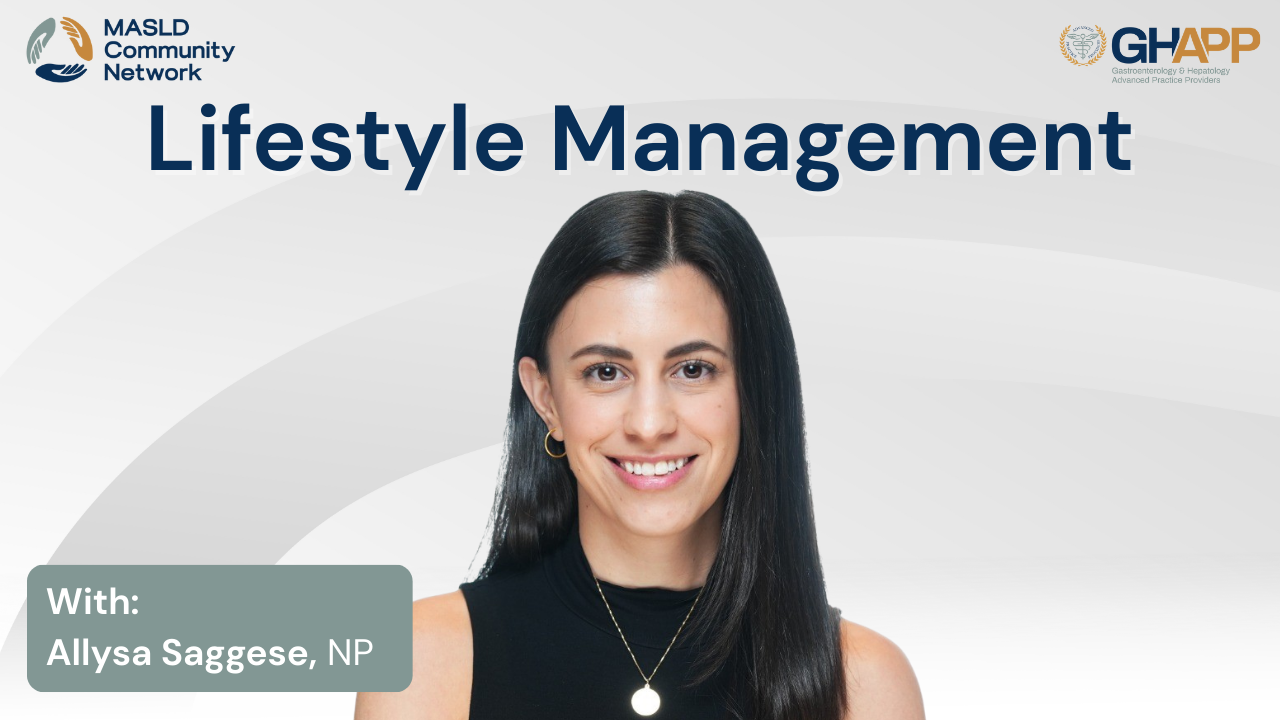
Lifestyle Management With Allysa Saggese

Join Allysa Saggese, NP, from Weill Cornell Medicine in New York City, for an insightful and practical discussion on lifestyle management for MASLD and MASH, presented through the GHAPP MASLD/MASH Community Network, sponsored by Madrigal Pharmaceuticals. In this case-based presentation, Allysa walks viewers through the non-pharmacologic strategies used to manage Metabolic Dysfunction-Associated Steatotic Liver Disease (MASLD), highlighting the role of nutrition, physical activity, and patient-centered counseling. Using a real-world example of a 65-year-old patient with obesity, diabetes, and steatosis, Allysa demonstrates how to assess fibrosis risk through non-invasive testing like FIB-4 and FibroScan, and explains how lifestyle modifications remain central to slowing disease progression—even in the era of advanced therapeutics. The session explores the importance of motivational interviewing, cultural dietary preferences, and how to structure effective, individualized conversations around reducing sugar intake, increasing movement at home, and achieving sustainable 5–10% weight loss to improve liver histology. Allysa also breaks down the metabolic interplay between central adiposity, insulin resistance, and liver inflammation, and shares counseling tips to build patient trust and long-term engagement. Whether you're a GI or hepatology provider, this session delivers real-world guidance to help empower patients to reverse early liver damage through everyday lifestyle changes.
Watch Now
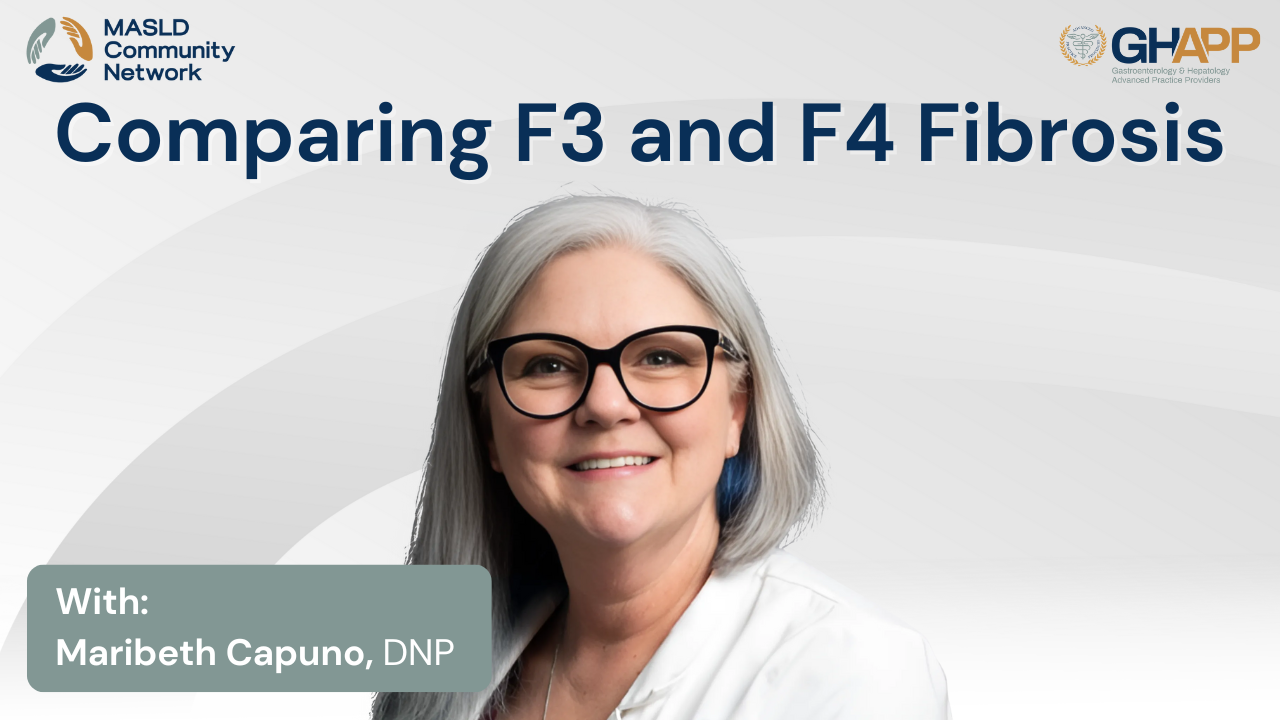
Comparing F3 and F4 Fibrosis With Maribeth Capuno

Join Maribeth Capuno, DNP, from the Richmond VA Medical Center, for an insightful case-based discussion on F3 vs. F4 fibrosis staging in patients with Metabolic Dysfunction-Associated Steatotic Liver Disease (MASLD) and MASH, presented through the GHAPP MASLD/MASH Community Network and sponsored by Madrigal Pharmaceuticals. Using the fictional case of “Sam,” Maribeth demonstrates how to differentiate between F3 and F4 fibrosis using non-invasive tools like FIB-4, FibroScan, and the ELF test, while explaining their respective cutoffs and clinical implications. Learn how to stage MASLD accurately, when to consider MRI elastography or liver biopsy, and how to initiate evidence-based management strategies including lifestyle modification, GLP-1 therapy, and the newly approved medication Resmetirom (Rezdiffra). The session highlights the importance of HCC surveillance, portal hypertension screening, and the nuances in monitoring between F3 and F4 fibrosis stages. With a strong emphasis on practical, guideline-aligned hepatology care, this video provides essential insights for clinicians managing the growing MASLD population.
Watch Now
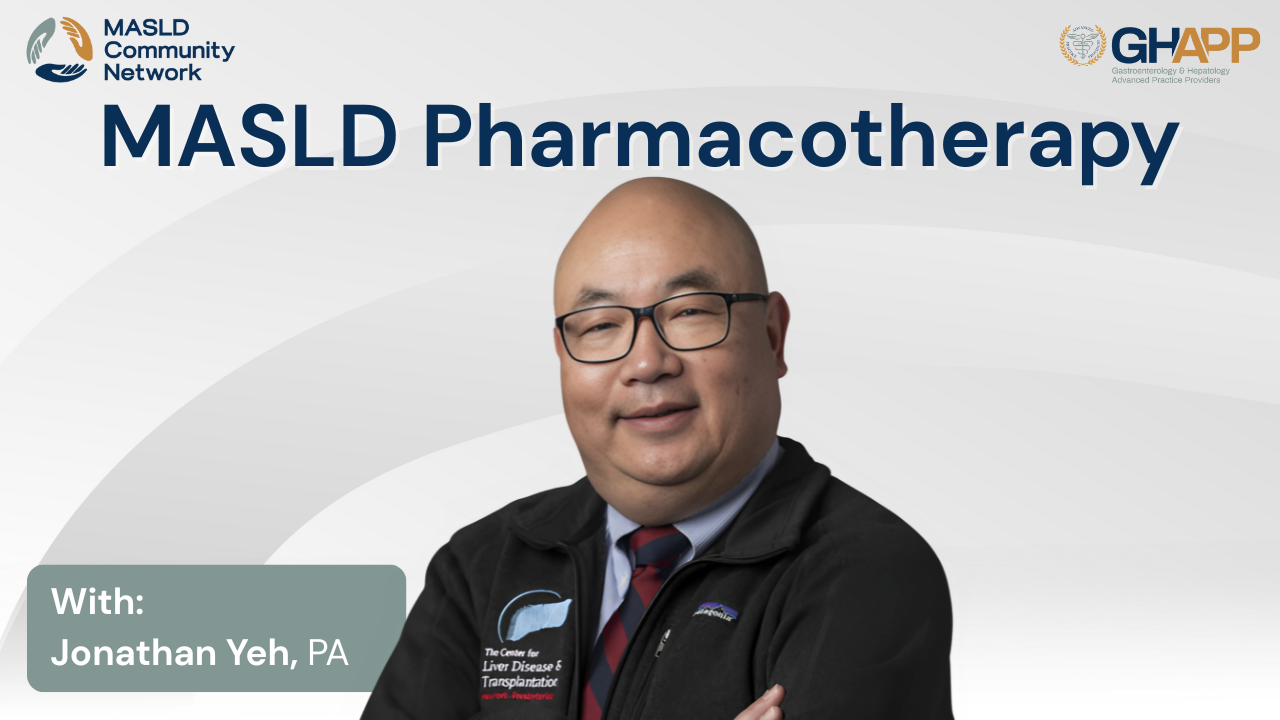
MASLD Pharmacotherapy With Jonathan Yeh

In this GHAPP MASLD Community Network Education Series, Jonathan Yeh, PA from Columbia University Irving Medical Center, reviews the latest advances in pharmacotherapy for MASLD (Metabolic Associated Steatotic Liver Disease) and MASH (Metabolic Associated Steatohepatitis). This presentation explores the evolution from NAFLD to MASLD, highlighting why metabolic dysfunction is central to disease progression. Jonathan discusses the role of lifestyle modification, GLP-1 receptor agonists (such as semaglutide and tirzepatide), vitamin E, pioglitazone, and bariatric surgery, while focusing on resmetirom—the first FDA-approved therapy for adults with non-cirrhotic MASH and moderate to advanced fibrosis. The session explains how resmetirom works as a thyroid hormone receptor beta agonist, its clinical trial evidence from the MAESTRO-NASH study, patient eligibility, safety considerations, drug–drug interactions, and monitoring recommendations. With ongoing studies and expanding treatment options, this discussion provides clinicians with practical strategies for managing MASLD and MASH, improving liver outcomes, and addressing the challenges of insurance access and long-term therapy.
Watch Now

Alcohol and MASLD/MASH: Navigating the Complex Relationship

In this insightful video, Jordan Mayberry, a seasoned physician assistant at UT Southwestern in Dallas, explores the complex intersection of alcohol use and metabolic-associated steatotic liver disease (MASLD), including its progressive form, MASH. With over 12 years of hepatology experience, Jordan breaks down why accurate assessment of alcohol intake is essential—not just for diagnosis but for guiding patient management. Learn how to use motivational interviewing techniques to respectfully screen for alcohol use, quantify intake effectively, and differentiate between MASLD, MASH, and the emerging diagnosis of MetALD (metabolic dysfunction-associated alcoholic liver disease). Jordan also shares practical tips on managing patients with MASH who drink above recommended thresholds, including behavioral interventions, medications like acamprosate, and referral pathways such as SMART Recovery or addiction psychiatry. The video also highlights how ongoing alcohol use can skew liver function tests (LFTs), distort non-invasive testing (NIT) results like FibroScan or MRE, and potentially affect eligibility for future MASH pharmacotherapies. This session is a must-watch for clinicians aiming to provide holistic, evidence-based care to patients navigating the dual challenges of liver disease and alcohol use.
Watch Now

Lifestyle Management With Anthony Derencius

Join Anthony Derencius, PA-C, at Pinnacle Clinical Research, for an in-depth, case-based discussion on the role of lifestyle management in MASH and MASLD. In this educational session from the GHAPP MASLD Community Network, Anthony walks through the real-world case of a 65-year-old patient with obesity, diabetes, and suspected metabolic liver disease, highlighting how to interpret non-invasive diagnostics like FIB-4 scores and transient elastography. He explains the clinical significance of metabolic risk factors, genetic predispositions (such as PNPLA3), and how personalized approaches to nutrition and exercise can alter the progression of fatty liver disease. With evidence-based insights on the Mediterranean diet, aerobic vs resistance training, and behavior change strategies, this video offers frontline strategies to support patients in reversing or slowing fibrosis. Watch to learn how providers can combine patient education, lifestyle interventions, and emerging pharmacotherapy to manage MASLD and MASH more effectively. Educational support provided by Madrigal Pharmaceuticals. For more disease state content, visit the GHAPP MASLD Community Network.
Watch Now

Liver Model Overview

Join Alison Moe, PA-C with United Digestive, as she walks through a hands-on demonstration using a life-sized liver model to help patients better understand fibrosis and liver disease progression. In this engaging and practical overview, Allison explains how different stages of liver fibrosis—from normal liver to cirrhosis and hepatocellular carcinoma—can be felt and visualized using a segmented anatomical model. She shares how this tool enhances patient education during discussions about non-invasive liver testing, such as FibroScan, CAP scores, FIB-4, ELF testing, and more. Designed to support visual learners and improve comprehension of disease state, this video is a valuable resource for clinicians and patients navigating the complexities of metabolic-associated fatty liver disease (MASLD) and its progression to MASH. Learn how tactile and visual teaching aids can bridge the gap between diagnostics and patient understanding in hepatology care.
Watch Now
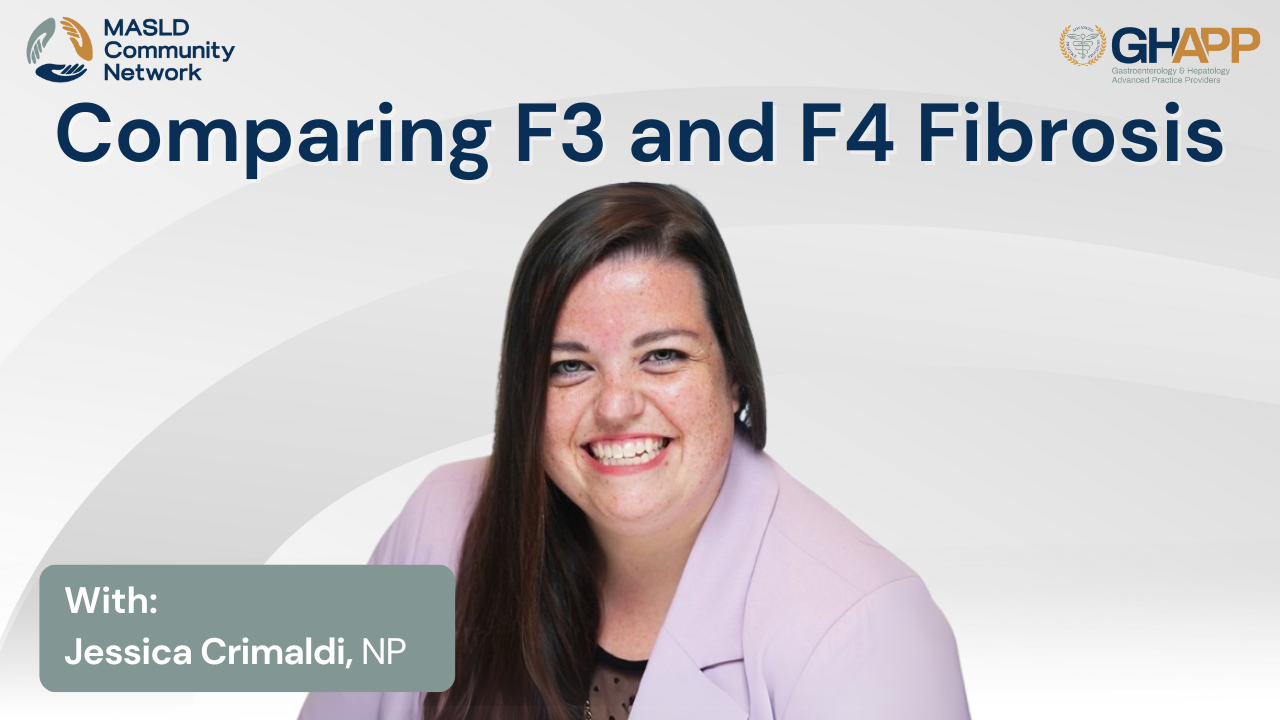
Comparing F3 and F4 Fibrosis With Jessica Crimaldi

In this educational session, Jessica Crimaldi, a nurse practitioner at Cleveland Clinic with nearly a decade of experience in gastroenterology and hepatology, walks through real-world cases comparing patients with F3 fibrosis and F4 fibrosis. She reviews how to assess disease severity using non-invasive tests like FIB-4, FibroScan, CAP scores, and ELF tests, and explains how clinical findings such as platelets, bilirubin, and INR can guide staging. Jessica highlights the differences in management between patients with advanced fibrosis versus cirrhosis, including the role of lifestyle modifications, GLP-1 therapy, statins, blood pressure control, and Resmetirom for eligible F2/F3 patients. She also discusses the importance of HCC surveillance, portal hypertension evaluation, esophageal varices screening, and long-term monitoring in cirrhosis care. This case-based learning approach offers practical insights into fatty liver disease, MASLD/MASH progression, and optimizing patient outcomes through accurate staging and tailored treatment strategies.
Watch Now

Differentiating Between F3 and F4

In this comprehensive discussion, HoChong Gilles, a nurse practitioner with 25 years of hepatology experience at the Richmond VA Medical Center, explores the critical importance of accurately distinguishing between F3 (advanced fibrosis) and F4 (cirrhosis) in patients with MASH (metabolic-associated steatohepatitis). While both stages carry increased risks of liver-specific and overall mortality, Gilles explains that F3 may still be reversible with lifestyle changes or pharmacotherapy, whereas F4 signals irreversible liver damage with heightened risk of complications like portal hypertension, hepatic encephalopathy, and liver cancer. Viewers will gain a deeper understanding of how non-invasive tests—like FIB-4, ELF, FibroScan, and MRE—perform in identifying fibrosis stage, including their limitations and overlaps. Gilles also outlines when to consider liver biopsy, especially in cases with discordant test results, atypical features, or clinical uncertainty. This video emphasizes how staging accuracy informs eligibility for therapies, surveillance strategies like HCC screening, and overall prognosis. Learn how to approach this nuanced distinction in clinical practice and why F3 vs. F4 isn't just semantics—it's a turning point in patient care.
Watch Now





 August 2025
August 2025 